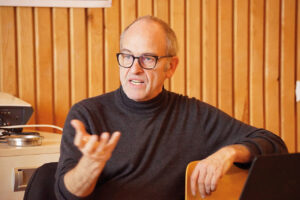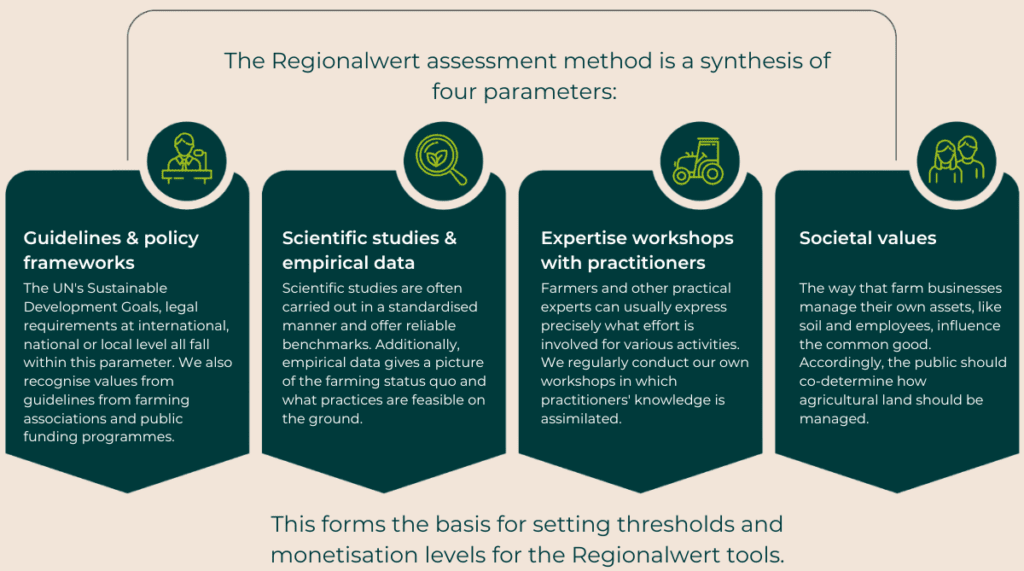Farming is
undervalued:
We make sustainable actions redeemable!
We see ourselves as a bridge between agriculture and society and are dedicated to supporting all farmers who want to have more sustainable businesses.

INTERESTED IN STARTING A PROJECT WITH US?
Would you like to test out a trial version of the performance calculation?
OUR PLEDGE

Our tools make sustainable performance in agriculture visible and quantifiable.
- Using our tools will give you an estimate about how much your practices are worth to ecology, society and the regional economy.
- The assessment method was developed together with farmers and advisors and has been well received in several countries, including Germany, Luxembourg, Spain, Brazil and Egypt.
- The tools are rooted in practical experience and can include up to 300 indicators, which are based on your own farm data entered in a simple online form.
- The results give a professional overview about the resilient aspects of your business and makes your practices easy to understand for a range of actors, from consumers to creditors.
We fight for farmers, pollinators and the soil!
Measuring the value of socioecological services
Farmers implement numerous practices to promote biodiversity, improve soil fertility or mitigate climate change. The online tool, the sustainable performance calculation, makes it possible to quantify these practices economically and to compensate and promote them.

Projects and collaborations
Thanks to the collaboration with Cbet, Association for biodynamic agriculture in Spain, the Biodynamic Federation Demeter International and SEKEM we have been able to adapt the tool to the conditions in countries such as:
Spain, Egypt, Argentina, Brazil, Chile, Colombia, Costa Rica, Dominican Republic and Mexico.
We are a multidisciplinary team based in Germany, where we work to revalue agriculture and the people who grow our food, fuel and fibre, and make our local economies more resilient. We are committed to making their efforts for sustainability recognisable for society.
Company headquarters: Eichstetten am Kaiserstuhl, Germany
Employees: 11
Sector: Agriculture
Chief Executive Officer: Christian Hiß
Our experience in setting and measuring indicators for sustainability are rooted in theoretical and practical experience. Our innovations are a result of more than a decade’s worth of research associated with the shareholding company Regionalwert AG Freiburg, whereby citizens invest in regional businesses along the agri-food supply chain to strengthen the local food economy.
Milestones:
2006: Regionalwert AG Freiburg is founded
2009: Socialecological report published, with 63 key performance indicators
2010: Christian Hiß receives a German Sustainability Award
2016: Start of research project “Sustainable performance accounting I” (now complete)
2018: Start of research project “Sustainable performance accounting II” (now complete)
2019: Research project “Quarta Vista” begins (now complete)
2020: Development and launch of the sustainable performance accounting
2021: Start of research projects “regiosöl” and “Value formation through dialogue” (now complete)
2021: Regionalwert Leistungen GmbH becomes a separate business entity from the Regionalwert AG Freiburg
2022: Sustainable performance calculation is adapted and piloted by farmers in Spain, Egypt and for Latin America
2022: Start of research project “Standardising documentation on sustainable performance”
The tool measures sustainability in agriculture with the aim of compensating actions that contribute to the common good, ecology and supporting your region.
The calculated results help you to get a more accurate picture of what socioecological services are linked to your practices and is a good future planning tool.
The result is easy to interpret and communicate to customers, distributors or society.
We know that many farmers already or would like to do more to implement agroecological practices and other socially beneficial measures, but lack the funding. We seek to give agroecological practices individual price tags, so that each farmer can be incentivised to farm in the way that is most sustainable for them.

Our method


FAQ
Of course! Our sustainability assessment reveals individual potentials of the farm and is thus suitable for targeted further development towards sustainability, independent of certification. We don’t see agriculture in black and white: for all the strengths of organic farming, for us sustainable agriculture means more than that – and we believe that many so-called conventional farms make their contribution here.
Yes. Our main tool in use is the sustainable performance calculation for agriculture, which assesses sustainability levels and gives practices a monetary value. Variants are currently available in German, Spanish and English. We also have a second instrument, called the farm sustainability assessment, which is similar to the calculation but only shows sustainability levels, i.e. without the financial valuation. Together with Regionalwert partners, we are working on developing tools for other sectors, beyond agriculture, that will also fall into the category of “sustainable performance tools”, based on the method developed by Christian Hiss in his publication “Richtig Rechnen” (loosely translated as “getting the numbers right”) in 2015. To know more, get in touch with us.
The effects and outcomes of agricultural damage on the environment and climate have been calculated many times. Our approach is more focused on prevention and positivity: we focus on the farm performance, i.e. farmers’ practices and efforts, and seek to make this visible and give it a financial value. In this way, money can flow in relation to performance and incentives can be set for action-based payments. This avoids taking complex measurements, since most of the data can be easily read from existing accounts or cultivation plans.
Our instruments were originally designed for German-speaking countries, but since 2022 we have prototypes for Spain, Egypt and several countries in Latin America. We also have a trial tool, with a smaller selection of data entry requirements and key performance indicators to get a feel for the tool, in case a tool for your country or region does not yet exist. If you would like to test the trial tool (only available in English), get in touch with us.
The farm manager or designated person on the farm is responsible for entering the data of the farm business. From our side there is no farm inspection or monitoring. We of course offer support to you at any time if you have questions or are unclear during the data entry!
The feedback we’ve received so far has been that it usually takes about 2 to 4 hours to complete. The better you know the processes on your farm, the easier it will be for you to get through the data entry form. If something comes up, you can always save your entry and continue at another time.
The entry form asks for data from the previous business year or deviating financial year. You determine which period you would like to have evaluated yourself at the beginning of the entry form. It’s important that all data is entered consistently from the same period!
We focus on all practices relating to primary production, which includes selling products directly to customers or slaughtering on-site. The questions in the data entry form are asked in such a way that it should be clear which data are required when. Otherwise, we are also available to answer questions if you are unsure.
By completing the sustainable performance calculation, you have taken a first important step: you have put a price tag on practices you do that are relevant for people and nature. Now it is time to communicate these services. With this result, you can approach traders, processors, banks or politicians. We are also in discussion with a number of these actors, to try and establish a way to build in more sustainability-linked rewards for farmers.
We train farm advisors to use our tools. They are the best people to talk to about how to move your farm towards more sustainability.
Yes, a deviation is possible. While the monetary value shows the sustainable contribution of the company during the assessment period, the colour scale classifies the value into percentages and levels, from strongly sustainable (dark green) to not sustainable (red). In most cases, the sustainability level does in fact influence the sustainable contribution estimated, but sometimes there is a deviation, which means that a high monetary value is not automatically the same as a strong sustainability level. This can largely be explained by our monetisation method: a number of key performance indicators use the turnover of the business as the basis for the monetisation.
We evaluate the following farm branches: crop production, vegetable growing, fruit growing, seed propagation, arable fodder, permanent grassland management and livestock farming (dairy cows, cattle, pigs, piglets, laying hens, broilers, turkeys, goats and sheep).

